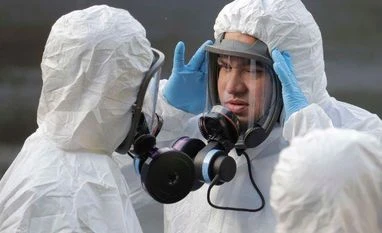The Democratic-controlled House, with President Donald Trump's support, early Saturday passed a bill to provide free testing for the coronavirus, as well as paid sick and family leave, strengthened unemployment insurance and increased food aid to ease the hardship on families.
The legislation will be taken up by the Senate next week. It would require paid leave for workers who contract the virus or who care for those who do and additional food aid for the poor and senior citizens.
For most people, the virus causes only mild or moderate symptoms, such as fever and cough. For some, it causes more severe illness, including pneumonia.
The vast majority of people recover from the virus.
It requires private health insurance plans to provide free coronavirus testing and waives cost-sharing rules for testing provided to people covered by Medicare, Medicaid and federal retirement programs.
Another $1 billion is provided to test people without health insurance. It boosts federal matching funds to state Medicaid programs by 6.2 per cent to ease the financial strain on states.
Also Read
It establishes a temporary coronavirus-related sick leave benefit paid by employers with fewer than 500 workers.
Workers with the coronavirus would receive 100 per cent or their wages if they have the coronavirus or are self-isolating and two-thirds of their pay when caring for family members. The benefit would expire in January 2021.
It also permits 12 weeks of job-protected family or medical leave at two-thirds pay, though the first 14 days of the extended leave would be unpaid. In both cases businesses would be reimbursed by the federal government through a refundable tax credit.
It provides $1.3 billion in emergency food aid for low-income pregnant women and their young children, senior citizens and food banks.
It allows states to provide food stamps to make up for lost school lunch benefits if their children are kept home from school and directs $100 million of the funds to U.S. territories.
Workers laid off because of the coronavirus outbreak are already eligible for unemployment benefits, but the legislation provides $1 billion for additional caseloads and administrative costs to encourage temporarily furloughed workers to obtain unemployment benefits.
The Occupational Safety and Health Administration would be required to issue a temporary rule requiring increased protections against the coronavirus.
)